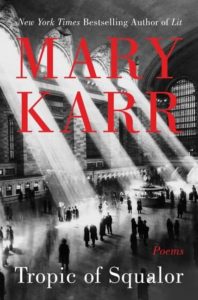The queen of literary memoir releases an exquisite collection of poems on May 8. Best known for the memoirs “Lit” and “The Liars Club,” Karr displays her formal mastery and heartfelt innovations in this collection that looks at the commingling of ribald humanity and the potentialities of God.
The first half collects poems on Karr’s usual themes—Texas memories, comic carnage, hidden violence. The second half, “The Less Holy Bible,” carries 20 poems named after chapters of the bible; each beautifully sordid poem is set around NYC.
With a Carl Jung quote as the epigraph, “Summoned or not summoned, the god will be there,” Karr finds God everywhere she walks: in salons, dingy stairwells, with bike messengers and men sleeping in doorways. Her poetic innovations are plain yet forceful, and these 20 sequential pieces quickly gain a staying force.
 As with her memoirs, there’s an undaunted gallop toward the truth. Though when she veers on the uncomfortable line between blaming a suicide and holding herself (then Wallace) accountable, some readers will brace against the callousness. Yet the humorous and limpid self-consciousness in poems about her ex, David Foster Wallace, are nonetheless beautiful, particularly “Suicide’s Note: An Annual” and “Face Down.”
As with her memoirs, there’s an undaunted gallop toward the truth. Though when she veers on the uncomfortable line between blaming a suicide and holding herself (then Wallace) accountable, some readers will brace against the callousness. Yet the humorous and limpid self-consciousness in poems about her ex, David Foster Wallace, are nonetheless beautiful, particularly “Suicide’s Note: An Annual” and “Face Down.”
Some readers have called this a cynical book, though it’s hard to agree with that final judgment with lines like, “I couldn’t bear the beams of love.”
Karr’s inversions of daily phenomena hint at the miracle of life: “we sigh you out into air and watch you rise like rain.” Formally and emotionally, this is a rich, mysterious collection that rewards re-reading. The first poem, “The Organ Donor’s Driver’s License Has a Black Check,” is by itself worth the price of admission.
On May 14, Karr will be at Books are Magic (225 Smith St) in discussion with Meghan O’Rourke at 730pm.
Contact: (718) 246-2665











